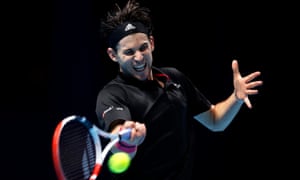Daniil Medvedev wins ATP Finals title after comeback floors Dominic Thiem | Sport
Daniil Medvedev is the king of tennis until someone proves otherwise, because his 4-6, 7-6 (2), 6-4 win over the world No 3 and US Open champion Dominic Thiem to lift the ATP Tour Finals trophy left the game’s best players, young and old, in a heap at his feet.
The 24-year-old Russian did what nobody has done here since Roger Federer 10 years ago: defeated Novak Djokovic and Rafa Nadal on the way to victory – and what nobody has done since David Nalbandian in 2007, by sweeping away the top three players in the world. He is also the sixth winner in six years. Change has arrived.
Stan Smith sent the winner congratulations on the jumbo courtside screen on the 50th anniversary of the event, the last in London after 12 years. “What a match, one of my best victories, two hours 42 minutes against Dominic,” Medvedev said. “Your name is already in the history books.” Thiem said: of his opponent, “Of course I’m disappointed but I’m also proud of my performance. Daniil really deserved it, a great match and an amazing year. I hope we will have many great matches to come.”
Medvedev reached the final with the best statistics in every department of the game except aces, where Thiem bettered him 37-31. When they got down to it, head to head, numbers were rendered irrelevant.
Medvedev, playing some delightful but reward-free tennis, blinked first. Thiem – who admitted he’d tightened up on key points in the semi-final against Djokovic on Saturday – broke for 3-2 after half an hour but his racket arm momentarily seized up again, and the Russian took him to deuce, before it got away from him.
A love hold lifted Thiem, not one of nature’s front runners. He conquered cramp and the scoreboard to overcome Alexander Zverev in the US Open final in September, and he has been similarly strong in this 12th and final London edition of this tournament: 2-5 down in the first-set breaker against Nadal, 0-4 behind in the deciding shootout against Djokovic. It is as if he is more comfortable in adversity, where he is sure of his inner strength.

Dominic Thiem took the first set at the O2 but eventually fell to Medvedev’s cerebral unpredictability. Photograph: Clive Brunskill/Getty Images
It was cruel for Medvedev, though, to lose the set when in control of the point and ready to force deuce only to see Thiem’s forehand clip the net and spin over his shoulder, his 37th point of the set to Medvedev’s 34th. It was still desperately close.
The mental and physical jousting continued on level terms in the second set. From a distance, they looked like the doppelgangers of Djokovic and Nadal, Medvedev the thin, angular retriever of lost causes, Thiem beavering away like a middleweight in search of a knockout. There was tension in every exchange, much of it created by Thiem as Medvedev struggled for rhythm and control of his delicate strategy. The Austrian should have pushed the door wide open in the seventh game, as Medvedev crazily charged the net behind an 83mph second serve on break point, but the snatched reply sailed wide. Thiem then overcooked a forehand to an unprotected court at deuce and the moment was gone.
Thiem, playing with a ferocity Medvedev countered with cerebral unpredictability, continued to explode huge ground strokes from all corners. After an edgy hold by Thiem they went to the tie-break, where Muscovite intellect prevailed, as Medvedev won six points in a row. Incredibly, the level climbed stratospherically as they went punch for punch in the third. Medvedev was gnawing at Thiem’s physical strength with his languid variety, yet he could not cash in on three break points in the third game against an opponent strong enough to hit a 99mph forehand, with both feet off the ground, and a good 15 feet behind the baseline.
The excellence did not abate, and, after nine chances, six of them in the concluding frame, Medvedev finally broke his man to lead 3-2. He was in a groove, and he stayed there to the line, although Thiem fought him on every point.
It was an eerie farewell to an event the former ATP chief executive Chris Kermode turned into the biggest cash cow outside the slams. Lights strategically placed in the empty seats whirred and clicked in the cavernous dark of an arena that holds between 17,000 and 18,000 customers in good times, all of which gave the false impression of life and excitement where none existed beyond the drama on the two-tone blue battlefield below. And there was no shortage of that.
At a venue that has accommodated 2.8million tennis fans since 2009 – most of them cheering for Roger Federer – the finalists were oblivious to the echo as their rackets pinged, their shoes screeched and their small teams dared to pierce the silence with the odd polite clap.
Embroidering the illusion for the television audience, meanwhile, were applause machines, much like those at fan-free televised football in this pandemic longueur. If we ever return to normal, will we remember what to do in the high points of athletic endeavour? The widespread hope is that Turn will hum and thrum to real cheers at the start of their five-year stewardship 12 months from now.“It’s been an unforgettable 12 years,” Colin Fleming observed on the ATP’s tennis channel. Just about on the money. But the final act will be remembered not just for the often excellent tennis but the absence of reality as we know it.

